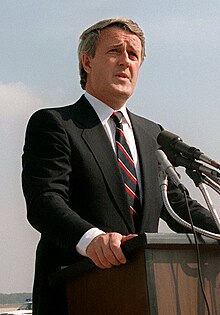
Back مارتن مولروني Arabic مارتن مولرونى ARZ Brayan Malruni AZ Браян Малруні BE ব্রায়ান মূলরোনি Bengali/Bangla Brian Mulroney Catalan Brian Mulroney Czech Brian Mulroney CY Brian Mulroney Danish Brian Mulroney German
Brian Mulroney | |||||||||||||||||||||||||||||
|---|---|---|---|---|---|---|---|---|---|---|---|---|---|---|---|---|---|---|---|---|---|---|---|---|---|---|---|---|---|
 Mulroney in 1984 | |||||||||||||||||||||||||||||
| 18th Prime Minister of Canada | |||||||||||||||||||||||||||||
| In office September 17, 1984 – June 25, 1993 | |||||||||||||||||||||||||||||
| Monarch | Elizabeth II | ||||||||||||||||||||||||||||
| Governors General | |||||||||||||||||||||||||||||
| Deputy | |||||||||||||||||||||||||||||
| Preceded by | John Turner | ||||||||||||||||||||||||||||
| Succeeded by | Kim Campbell | ||||||||||||||||||||||||||||
| Leader of the Opposition | |||||||||||||||||||||||||||||
| In office August 29, 1983 – September 17, 1984 | |||||||||||||||||||||||||||||
| Preceded by | Erik Nielsen | ||||||||||||||||||||||||||||
| Succeeded by | John Turner | ||||||||||||||||||||||||||||
| Leader of the Progressive Conservative Party | |||||||||||||||||||||||||||||
| In office June 11, 1983 – June 13, 1993 | |||||||||||||||||||||||||||||
| Preceded by | Erik Nielsen (interim) | ||||||||||||||||||||||||||||
| Succeeded by | Kim Campbell | ||||||||||||||||||||||||||||
| |||||||||||||||||||||||||||||
| Personal details | |||||||||||||||||||||||||||||
| Born | Martin Brian Mulroney March 20, 1939 Baie-Comeau, Quebec, Canada | ||||||||||||||||||||||||||||
| Died | February 29, 2024 (aged 84) Palm Beach, Florida, U.S. | ||||||||||||||||||||||||||||
| Resting place | Notre Dame des Neiges Cemetery, Montreal, Quebec | ||||||||||||||||||||||||||||
| Political party |
| ||||||||||||||||||||||||||||
| Spouse | |||||||||||||||||||||||||||||
| Children | 4, including Caroline and Ben | ||||||||||||||||||||||||||||
| Relatives | Jessica Mulroney (daughter-in-law) | ||||||||||||||||||||||||||||
| Education |
| ||||||||||||||||||||||||||||
| Signature | |||||||||||||||||||||||||||||
Martin Brian Mulroney[a] (March 20, 1939 – February 29, 2024) was a Canadian lawyer, businessman, and politician who served as the 18th prime minister of Canada from 1984 to 1993.
Born in the eastern Quebec city of Baie-Comeau, Mulroney studied political science and law. He then moved to Montreal and gained prominence as a labour lawyer. After placing third in the 1976 Progressive Conservative leadership election, he was appointed president of the Iron Ore Company of Canada in 1977. He held that post until 1983, when he became leader of the Progressive Conservatives. He led the party to a landslide victory in the 1984 federal election, winning the second-largest percentage of seats in Canadian history (at 74.8 percent) and receiving over 50 percent of the popular vote. He later won a second majority government in 1988.
Mulroney's tenure as prime minister was marked by the introduction of major economic reforms, such as the Canada–United States Free Trade Agreement, the goods and services tax (GST) that was created to replace the manufacturers' sales tax, and the privatization of 23 of 61 Crown corporations including Air Canada and Petro-Canada. However, he was unsuccessful in reducing Canada's chronic budget deficit. Mulroney sought Quebec's endorsement of the 1982 constitutional amendments by first introducing the Meech Lake Accord and then the Charlottetown Accord. Both proposed recognizing Quebec as a distinct society, extending provincial powers, and extensively changing the constitution. Both of the accords failed to be ratified, and the Meech Lake Accord's demise revived Quebec separatism, leading to the rise of the Bloc Québécois. In foreign policy, Mulroney strengthened Canada's ties with the United States and opposed the apartheid regime in South Africa, leading an effort within the Commonwealth to sanction the country. Mulroney's tenure was marked by the Air India Flight 182 bombing, the largest mass killing in Canadian history, though his response to the attack came under criticism. Mulroney made environmental protection a priority by securing a treaty with the United States on acid rain, making Canada the first industrialized country to ratify the Convention on Biological Diversity, adding significant national parks, and passing the Environmental Assessment Act and the Environmental Protection Act.
The unpopularity of the GST and the controversy surrounding its passage in the Senate, combined with the early 1990s recession, the collapse of the Charlottetown Accord, and growing Western alienation that triggered the rise of the Reform Party, caused a stark decline in Mulroney's popularity, which induced him to resign and hand over power to his cabinet minister Kim Campbell in June 1993. In the election later that year, the Progressive Conservatives were reduced from a majority government of 156 seats to two, with its support being eroded by the Bloc and Reform parties. In his retirement, Mulroney served as an international business consultant and sat on the board of directors of multiple corporations. Although he places above average in rankings of Canadian prime ministers, his legacy remains controversial. He was criticized for his role in the resurgence of Quebec nationalism and accused of corruption in the Airbus affair, a scandal that came to light only several years after he left office.
Cite error: There are <ref group=lower-alpha> tags or {{efn}} templates on this page, but the references will not show without a {{reflist|group=lower-alpha}} template or {{notelist}} template (see the help page).